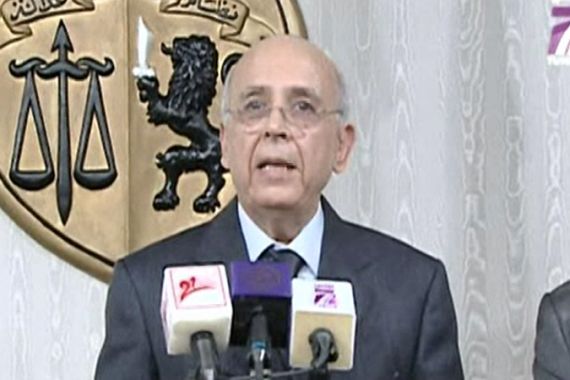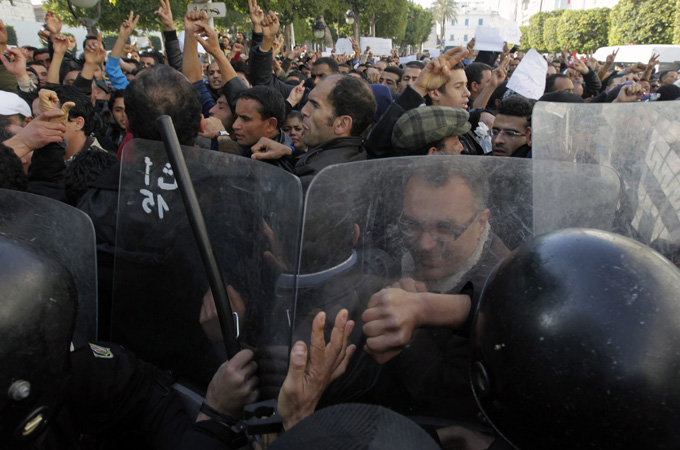Tunisia PM forms ‘unity government’
Mohamed Ghannouchi has announced the new “national unity government”, with several key posts kept by the old guard.

 |
| Demonstrators demanded that the members of the ruling party of the ousted president should step down [Reuters] |
Mohamed Ghannouchi, the Tunisian prime minister, has announced that the former defence, foreign, interior and finance ministers will keep their key posts in the new national unity government formed after public uprising led to the toppling of Zine El Abidine Ben Ali as president.
Ghannouchi announced the country’s new interim government on Monday, adding that a number of opposition members will be assigned to ministerial posts.
The prime minister named Najib Chebbi, founder of the Progressive Democratic Party (PDP), which opposed Ben Ali, as minister for regional development.
Ahmed Ibrahim, leader of the Ettajdid party, was named minister of higher education and Mustafa Ben Jaafar, head of the Union of Freedom and Labour, got the health portfolio.
Significantly, there will be a separation of the state from political parties, meaning that under the coalition government, the collection of parties will not fall under the control of a ruling party.
Al Jazeera’s James Bays, reporting from Ghannouchi’s office in Tunis, said that a list of the new cabinet ministers had been released and that a senior diplomat told him that the new government consisted of “quite a lot of the old guard and not so much of the new”.
Bays said that there was a considerable amount of anger among the Tunisian press as Ghannouchi, Ben Ali’s right-hand man in the Constitutional Democratic Rally (CDR), refused to answer questions after making the statement of the new government.
Public push for change
While a curfew is now in effect, in the hours preceding the announcement of the new government, Ayman Mohyeldin, Al Jazeera’s correspondent reporting from the capital Tunis, said that protesters were out in force.
Mohyeldin said they were “rejecting the possibility that any incoming or caretaker or national unity government could possibly have figures or leaders from the previous regime”.
They want the CDR party completely abolished, completely removed from any form of government”.
Our correspondent added that protesters”want to see some of their representatives really take over some of these key positions.”
Fouad Mebazza, Speaker of parliament sworn in as interim president, had asked Ghannouchi to form a government of national unity, and constitutional authorities said a presidential election should be held within 60 days.
Opposition’s limited role
One of Tunisia’s best known opposition figures, Moncef Marzouki, on Monday branded his country’s new government a “masquerade” still dominated by supporters of ousted strongman Ben Ali.
“Tunisia deserved much more,” the secular leftist declared. “Ninety dead, four weeks of real revolution, only for it to come to this? A unity government in name only because, in reality, it is made up of members of the party of dictatorship, the RCD,”said Marzouki on France’s I-Tele.
He complained that, despite Ben Ali having fled the country to escape a popular revolt, his supporters in the former ruling party had retained key government posts, including the interior ministry “which is supposed to organise elections”.
(In fact, according Ahmed Friaa, Tunisia’s interior minister, 78 people have been killed in the country during the recent turmoil, almost quadrupling the official death toll. He also estimated that the unrest had cost the country’s economy $2.2 bn as a result of disruption of economic activity and lost export revenues.)
Rachid al-Ghannouchi (no relation to Mohamed Ghannouchi), the exiled leader of the Nahdha Movement party, told London-based Asharq Alawsat newspaper that leaders of his party had not been invited to participate in the negotiations in forming the new unity government.
Ghannouchi said he believed there was “deliberate alienation to Islamists in Tunisia”. But he added that “If we were invited in the future for taking part in the government, we would consider the offer”.
Meanwhile Ban Ki-Moon, UN secretary general, called for the establishment of the rule of law in Tunisia, while the Arab League said Arab states should consider what lessons could be learned from the crisis.
Reforms announced
Ghannouchi also announced on Monday that the Tunisian government will investigate anyone suspected of corruption or of having amassed huge wealth under the country’s deposed leader.
“Anyone who accumulated enormous wealth or is suspected of corruption will be put before a committee of investigators,” said Ghannouchi.
He also said that there will be “total freedom” for the media in the country, which experienced especially tough crackdowns during the recent weeks of unrest.
Additionally, the prime minister said that a ban on the activities of human rights groups in Tunisia will be lifted and that all political prisoners would be freed.
“We have decided to free all the people imprisoned for their ideas, their beliefs or for having expressed dissenting opinions,” said Ghannouchi.